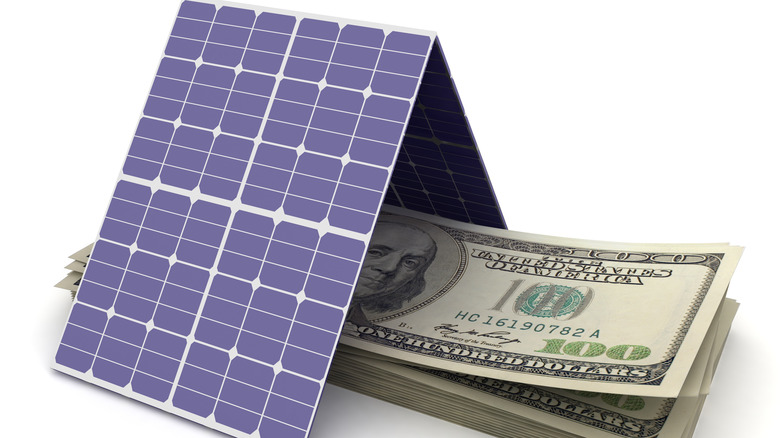Are Solar Panel Tax Credits Refundable? What You Need To Know
Solar energy has grown more accessible over the years, and there are a lot of ways that it can save you a fair bit of money in the long run. The first and most obvious way is through the energy that solar panels generate, since they can eventually end up paying for themselves. Not only can these help offset your electric bill and improve the value of your home, but power companies may actually end up paying you for excess electricity that goes back on the grid if your panels produce more energy than you use. You also might have heard a few rumors flying around that there are U.S. government-funded benefits to installing solar panels in your home. Heck, you can even get a tax credit for your EV.
But knowing these incentives exist and knowing how they work are two different things. How much do they cover? Where do you file for them? Do they only reduce your taxes, or is any excess credit you might have refundable? Having answers to these questions might help you decide if getting solar panels installed on your home is the right financial decision for you.
How much do solar panel tax credits cover?
If you're planning to invest in a solar-powered energy system for your home, then one of the first things that you're probably going to want to know is how much money you can save. Right now, those who invest in solar, wind, or geothermal energy in the U.S. can qualify for the Residential Clean Energy Credit. The IRS states that this "equals 30% of the costs of new, qualified clean energy property for your home installed anytime from 2022 through 2032." It will then drop to a 26% credit in 2033 and a 22% credit in 2034, after which the program is scheduled to end. This applies to solar electric panels, solar water heaters, wind turbines, geothermal heat pumps, fuel cells, and, as of 2023, battery storage technology. According to Forbes, it costs an average of $16,000 to switch to a fully solar-powered home in the U.S. This means the federal credit could end up saving you right around $5,000.
The federal tax credit is the biggest one on offer, but residents of some states might be able to get a few other rebates or incentives. These can range from rebates to tax breaks on increased property values. Ecowatch claims that New York, Massachusetts, Maryland, Oregon, Illinois, New Hampshire, California, Washington, and South Carolina offer the best incentives, so it's definitely worth looking into if you call one of these states home.
How do you file for solar panel tax credits?
In order to get the credit, you're going to need to file Form 5695 with your taxes. This is a brief, three-page form that requires you to break down the total cost of the solar property that you have purchased to have installed on your home. It will also require you to verify if the products are new and add the costs of any other green initiatives that you have implemented in the year. You will then need to enter the calculated total on your 1040. The IRS specifies, "You must claim the credit for the tax year when the property is installed, not merely purchased."
Those who file their taxes through TurboTax will be able to do this as part of the company's portal-based filing service. The portal should prompt you once you reach the section on tax deductions, but you can search for "5695, residential energy credit" if it doesn't. Once you've done that, select the 'Jump to' link and then select 'Yes' and 'Continue' at the bottom of the Energy Saving Home Improvements screen. This should add Form 5695 to your return, at which point you should be able to fill it out normally and claim the credit.
Are excess solar panel tax credits refundable?
Now for the big question. Can you get a return if your tax credit exceeds the amount owed? There is very little information provided on the IRS website about this, but according to TurboTax, the answer is no. "These tax credits directly reduce your tax," TurboTax states. "For example, if you owe $1,000 in federal taxes but are eligible to claim a $1,000 tax credit, your net tax liability drops to zero. However, these credits are non-refundable credits, meaning that they can lower your taxes but won't result in a refund."
Even so, any extra credit that might be left over after bringing your amount owed to zero isn't necessarily wasted. TurboTax also claims that "You may have the opportunity to roll over unused portions of tax credits to future years, allowing you to use them to reduce your future tax liability." So while you can't get a return from it, you may be able to roll that credit over to count against future debts. Talking with a tax professional will help ensure you're getting the most out of the credit.



